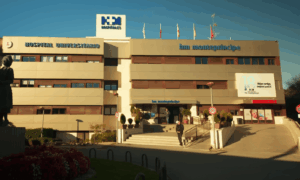Intestinal cancer
Disease description
Intestinal cancer is a malignant tumor that develops in the sections of the small or large intestine. Among men, this pathology is more common than among women and ranks second in prevalence after lung cancer.
Cancer of the small intestine is diagnosed much less frequently. The majority of oncological intestinal diseases are colon cancer, or colorectal cancer. Nearly half of all colon tumor cases occur between the ages of 60 and 70.
Symptoms that indicate the need for diagnosis and treatment
The clinical manifestations of intestinal cancer depend on the localization, size, and stage of the malignant process. Specific symptoms appear only at later stages, while at the early stage the disease is difficult to diagnose.
Main signs of intestinal cancer:
- Weakness, fatigue, poor appetite, unexplained weight loss
- Unstable stool (diarrhea alternating with constipation)
- Presence of blood in stool
- Abdominal pain (usually dull in nature)
For small intestine cancer, additional characteristic features include dyspeptic (digestive) disorders: belching, heartburn, bloating, heaviness after eating.
Diagnosis and treatment methods
Diagnosis
- Laboratory tests: blood, urine, coprogram, fecal occult blood test, tumor marker test
- To diagnose small intestine cancer, EGD (esophagogastroduodenoscopy) is used; for large intestine cancer — colonoscopy or irrigoscopy. In modern global clinics, these procedures are performed under sedation, which significantly simplifies their implementation for both patients and doctors
- Ultrasound (US)
- CT, MRI
Treatment
Surgical treatment at early stages allows for complete tumor removal, restoration of intestinal function, and prevention of recurrence in 95% of cases.
Chemotherapy and radiation therapy are often combined with surgical methods. In the case of intestinal cancer, a comprehensive treatment approach is considered the most effective. These methods may also be used independently for inoperable tumors to slow the growth of cancer cells and metastases.
Highly qualified oncological surgeons in Europe use an advanced method of treatment for bowel cancer — hyperthermic intraperitoneal chemotherapy (HIPEC). The procedure is performed during surgery and involves the administration of a chemotherapeutic agent directly to the tumor site.
Innovations in global clinics
In the USA, a new artificial intelligence-based program called CAD EYE has been developed to help detect polyps and cancerous tumors during endoscopy. When a suspicious lesion is identified on the intestinal mucosa, visual and auditory alerts are triggered. The system is activated via buttons on the endoscope handle.
Top clinics
-
 Baden-Baden, Germany Max Grundig Clinic
Baden-Baden, Germany Max Grundig Clinic -
 Seoul, South Korea Asan Medical Center
Seoul, South Korea Asan Medical Center -
 Jerusalem, Israel Hadassah Medical Center
Jerusalem, Israel Hadassah Medical Center -
 Petah Tikva, Israel Medical Center “Rabin”
Petah Tikva, Israel Medical Center “Rabin” -
 Istanbul, Turkey Medipol Mega University Hospital
Istanbul, Turkey Medipol Mega University Hospital -
 Istanbul, Turkey Istanbul Florence Nightingale Hospital
Istanbul, Turkey Istanbul Florence Nightingale Hospital -
 Geneva, Switzerland Hirslanden Clinique La Colline
Geneva, Switzerland Hirslanden Clinique La Colline -
 Geneva, Switzerland Generale-Beaulieu
Geneva, Switzerland Generale-Beaulieu -
 Istanbul, Turkey Acibadem Altunizade
Istanbul, Turkey Acibadem Altunizade -
 Istanbul, Turkey Medistate International Hospital
Istanbul, Turkey Medistate International Hospital -
 Istanbul, Turkey Acıbadem Ataşehir Clinic
Istanbul, Turkey Acıbadem Ataşehir Clinic -
 Antalya, Turkey Hospital Medical Park Antalya
Antalya, Turkey Hospital Medical Park Antalya -
 Dubai, UAE NMC Healthcare
Dubai, UAE NMC Healthcare -
 Istanbul, Turkey Hospital “Memorial Şişli”
Istanbul, Turkey Hospital “Memorial Şişli” -
 Milan, Italy San Donato Hospital in Milan, Italy
Milan, Italy San Donato Hospital in Milan, Italy -
 Milan, Italy San Raffaele University Hospital
Milan, Italy San Raffaele University Hospital -
 Abu Dhabi, UAE Burjeel Hospital Abu Dhabi
Abu Dhabi, UAE Burjeel Hospital Abu Dhabi -
 Vienna, Austria Debling Private Clinic
Vienna, Austria Debling Private Clinic -
 Vienna, Austria Confraternität Private Hospital
Vienna, Austria Confraternität Private Hospital -
 Heidelberg, Germany Heidelberg University Hospital
Heidelberg, Germany Heidelberg University Hospital -
 Hamburg, Germany Asklepios Nord Heidberg
Hamburg, Germany Asklepios Nord Heidberg -
 Dusseldorf, Germany FKKD Clinical Complex
Dusseldorf, Germany FKKD Clinical Complex -
 Winterthur, Switzerland Clinic "Lindberg"
Winterthur, Switzerland Clinic "Lindberg" -
 Incheon, South Korea Gil Medical Center at Gachon University
Incheon, South Korea Gil Medical Center at Gachon University -
 Lausanne, Switzerland Clinique Montchoisy
Lausanne, Switzerland Clinique Montchoisy -
 Nyon, Switzerland Clinique Genolier
Nyon, Switzerland Clinique Genolier -
 Istanbul, Turkey “Memorial Ataşehir” Clinic
Istanbul, Turkey “Memorial Ataşehir” Clinic -
 Bodrum, Turkey Acibadem Bodrum Hospital
Bodrum, Turkey Acibadem Bodrum Hospital -
 Barcelona, Spain QuironSalud Barcelona Hospital
Barcelona, Spain QuironSalud Barcelona Hospital -
 Barcelona, Spain Medical Center "Teknon"
Barcelona, Spain Medical Center "Teknon" -
 Barcelona, Spain University Hospital Barnaclinic+
Barcelona, Spain University Hospital Barnaclinic+ -
 Madrid, Spain University Hospital HM Monteprincipe
Madrid, Spain University Hospital HM Monteprincipe -
 Hamburg, Germany Asklepios Klinik Barmbek
Hamburg, Germany Asklepios Klinik Barmbek -
 Gebze, Turkey Anadolu Clinic
Gebze, Turkey Anadolu Clinic -
 Zurich, Switzerland Hirslanden Clinic
Zurich, Switzerland Hirslanden Clinic -
 Madrid, Spain Quiron Salud University Hospital
Madrid, Spain Quiron Salud University Hospital -
 Lugano, Switzerland Saint Anna Clinic
Lugano, Switzerland Saint Anna Clinic -
 Geneva, Switzerland Clinique des Grangettes
Geneva, Switzerland Clinique des Grangettes -
 Duesseldorf, Germany Oncological Center Dusseldorf
Duesseldorf, Germany Oncological Center Dusseldorf -
 Seoul, South Korea Samsung Medical Center
Seoul, South Korea Samsung Medical Center -
 Seoul, South Korea Medical Center at Ewha Womans University
Seoul, South Korea Medical Center at Ewha Womans University -
 SNUH
SNUH









































